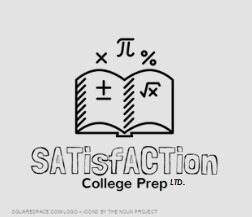How We Can Help You Excel on the SAT®/ACT® Exams:
The SAT® and ACT® exams are remarkably similar, and the process is the same:
Know Your Goal...
Math
Primary math focus for both SAT® and ACT® exams centers around Algebra II. Some basic algebra, geometry, and precalc problems are also included, but the vast majority includes factoring, graphing, and other topics commonly found in second year algebra. It is recommended that the student have taken or be enrolled in Algebra II in secondary school, but not required. Focused guidance helps students acquire a large amount of material in a short amount of time, regardless of background. (Remedial classes are available if student has not successfully mastered Algebra I, but random one-off topic questions from such earlier subjects are normal and easily addressed within the scope of the regular program.)
Diagnostics will dive deep into the student's background, determining any gaps in the child's understanding from previous classes and presenting that material in a way that works for the student. Any previous difficulties with teachers or teaching methods will also be addressed and soothed, allowing the student to understand that he or she is fully capable of "doing math", such difficulties typically reflect poorly on the teachers involved, not the student, and that math is ultimately supposed to be fun!
By the end of the program, the student will understand all concepts covered on the SAT®/ACT® exams, as well as be able to synthasize multiple topics in single questions, as presented on the exams.
Reading
Primary reading/writing focus for both SAT® and ACT® exams centers around basic grammar rules, reading comprehension, and synthesis of ideas, including data, graphs, and other elements of scientific literature. English requirements in most US secondary schools are typically sufficient to prepare students for this portion of the program.
Diagnostics will assess student's enjoyment of reading and verbal communication, emphasizing the efficacy of finding methods of exposure that are fun for the student. Any shortfall in reading comprehension will be addressed organically, highlighting the many ways students already know how to communicate effectively and extrapolating to advanced concepts from basic skills already second-nature to most children. Again, fun is typically the best way to reach both children and adults, and personal, focused attention allows the teacher to hone in on the learning methods that the individual student enjoys, rather than the ones the teacher or school administration might prefer presenting.
Typical assigned reading material is determined together by teacher and student, and has previously included sports, adventure, sci-fi/fantasy, mystery, young adult, anything that the particular student would already enjoy. Vocabulary is best learned in context, so flash-cards are not required. Discussion of reading material ensures comprehension and allows student to follow up with any questions about what he or she has read. The student then practices repeatedly with actual test questions in order to ensure he or she can carry these skills over to the final exam.
Essay
The essay is not required for either SAT® or ACT® exams, but is highly recommended due to college's preference to receive as much information about their prospective students as possible. Essay questions for both the SAT® and ACT® exams tend to be very similar in nature, both towards each other and from year to year. Emphasis is placed on the student's ability to analyze and articulate an argument, not necessarily the conculsion itself.
Diagnostics asses the student's current writing ability and ease of flow, focusing on specific benchmarks sought by test officials. Practice topics are initially chosen that are of interest to the particular student, although exposure to common test prompts is increasingly included, focusing on the ability to write on any topic, specifically those seen most frequently on the exams. Example essays published by the various test boards provide illustration of how test officials score, and consistent feedback on student's own practice essays allows iteration towards the highest score possible.
Remedial classes are provided if students have virtually no writing experience, but typical secondary students have had sufficient practice through normal schoolwork to be prepared for the regular program.



